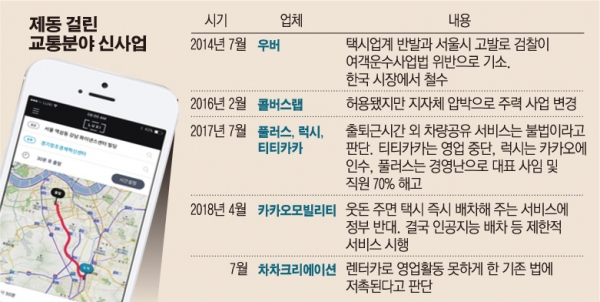List
Story > NEWS > Detail
[News] Legal Necessity for Mobility Sharing
With the spread of shared economy concepts and advances in technology, the ICT-based Internet and mobile platforms are creating innovations across multiple industries, as well as the passenger transport industry, Uber is a good example of this change. While some countries view services such as Uber as innovative services based on ICT development and are embracing them by readjusting relevant laws and systems in accordance with the trend of market change, others prohibit operations if they fail to meet the requirements required by existing transportation and taxi services. However, it seems that countries that ban services such as Uber in accordance with global trends are gradually reorganizing the system in parallel with market-friendly support and protection of existing economic players in terms of boosting people's benefits and revitalizing the economy, rather than unconditionally regulating it.

In the case of Korea, the market for vehicle and passenger sharing services is increasingly expanding due to the spread of shared economic models following the fourth industrial revolution, but individual ride sharing services like Uber are legally prohibited. Although Uber started its service in Korea in 2014, there was even a case of criminal punishment for those who provided such services for violating the Real Estate Act under the Passenger Car Transport Business Act and the Act on the Development of Taxi Transport Business. Accordingly, Korea currently operates only B2C-type vehicle sharing services such as "Soka" and "Green Car" or mobile taxi call platforms such as UberTaxi and Kakao Taxi, which operate through partnerships with private and corporate taxi drivers.
On the other hand, with respect to the vehicle sharing service, we or Ra do not yet stipulate in separate laws the form of a vehicle sharing transport business that shares vehicles on a time unit or on a divisional basis, but consider it a form of rental business that falls under the category of the Passenger Automobile Transport Business Act. As a result, there are many problems such as increased instability in the related insurance system, blind spots for accident compensation, and social problems caused by illegal operation. Starting with 'Shared Seoul', which was started by Seoul City in 2012, vehicle sharing service has been expanding in Korea, but in terms of utilization, there are still many tasks that need to be solved socially and institutionally in order to streamline the service.

<Photographic Source: Green Car>
The use of ride-sharing platform services is expected to expand further in the future in the global era without borders, which is communicating with various online media. As a result, services such as Uber, DidiChuxing, Grab and Gojek are rapidly spreading internationally, and many countries are gradually supplementing the system by providing support for existing economic entities and innovation projects rather than unconditionally regulating them. In the case of the United States and China, legislation is underway to recognize mobile platform-based ride-sharing services as new areas, establish a new licensing system, and continue to review taxi regulations. On the other hand, when ride-sharing services such as the U.S. and China have not been activated properly due to excessive regulations on the protection and protection of existing industries and existing operators, the case like the U.S. and China has much to suggest to Korea, which are unconditionally rejecting them, citing illegal laws. While domestic ride-sharing service companies such as Uber, Left, China's Didi Chasing, Southeast Asia's Grab and Gojeck are rapidly growing in each country, legal standards and systems for ride-sharing platform services are not well-organized in Korea, and even the country's platform sharing is not properly settled due to the closed policy of blocking the provision of services similar to taxi operations.

<Photo Source: Jakarta Economic Newspaper]
However, such issues as the legal nature of ride-sharing platform services, equity issues with the existing taxi industry, newly raised labor legal issues, consumer protection issues, and the government's role and desirable regulatory direction are tasks that will continue to be required throughout the shared economy service sector as well as the ride-sharing service sector, and cannot be permanently prevented from entering such a new service model. In order to solve new legal problems caused by new values and technologies, the relevant laws and regulations must be developed continuously, and preparations must be made to respond to these problems quickly.
Therefore, it is time to seek a national level response in this situation. The government should work together with micro-economic efforts to create conditions and environments that can develop and create new types of businesses that offer diverse benefits to consumers from a long-term perspective and macro-prudential efforts to come up with a legal system that can accurately reflect the reality. In particular, to solve these problems, it needs to be avoided simply by applying the same regulations as existing similar projects, and a new interpretation and conversion to the existing traditional legal judgments that ride-sharing platform services stand to be practically accepted in our country.
With the spread of shared economy concepts and advances in technology, the ICT-based Internet and mobile platforms are creating innovations across multiple industries, as well as the passenger transport industry, Uber is a good example of this change. While some countries view services such as Uber as innovative services based on ICT development and are embracing them by readjusting relevant laws and systems in accordance with the trend of market change, others prohibit operations if they fail to meet the requirements required by existing transportation and taxi services. However, it seems that countries that ban services such as Uber in accordance with global trends are gradually reorganizing the system in parallel with market-friendly support and protection of existing economic players in terms of boosting people's benefits and revitalizing the economy, rather than unconditionally regulating it.

In the case of Korea, the market for vehicle and passenger sharing services is increasingly expanding due to the spread of shared economic models following the fourth industrial revolution, but individual ride sharing services like Uber are legally prohibited. Although Uber started its service in Korea in 2014, there was even a case of criminal punishment for those who provided such services for violating the Real Estate Act under the Passenger Car Transport Business Act and the Act on the Development of Taxi Transport Business. Accordingly, Korea currently operates only B2C-type vehicle sharing services such as "Soka" and "Green Car" or mobile taxi call platforms such as UberTaxi and Kakao Taxi, which operate through partnerships with private and corporate taxi drivers.
On the other hand, with respect to the vehicle sharing service, we or Ra do not yet stipulate in separate laws the form of a vehicle sharing transport business that shares vehicles on a time unit or on a divisional basis, but consider it a form of rental business that falls under the category of the Passenger Automobile Transport Business Act. As a result, there are many problems such as increased instability in the related insurance system, blind spots for accident compensation, and social problems caused by illegal operation. Starting with 'Shared Seoul', which was started by Seoul City in 2012, vehicle sharing service has been expanding in Korea, but in terms of utilization, there are still many tasks that need to be solved socially and institutionally in order to streamline the service.

<Photographic Source: Green Car>
The use of ride-sharing platform services is expected to expand further in the future in the global era without borders, which is communicating with various online media. As a result, services such as Uber, DidiChuxing, Grab and Gojek are rapidly spreading internationally, and many countries are gradually supplementing the system by providing support for existing economic entities and innovation projects rather than unconditionally regulating them. In the case of the United States and China, legislation is underway to recognize mobile platform-based ride-sharing services as new areas, establish a new licensing system, and continue to review taxi regulations. On the other hand, when ride-sharing services such as the U.S. and China have not been activated properly due to excessive regulations on the protection and protection of existing industries and existing operators, the case like the U.S. and China has much to suggest to Korea, which are unconditionally rejecting them, citing illegal laws. While domestic ride-sharing service companies such as Uber, Left, China's Didi Chasing, Southeast Asia's Grab and Gojeck are rapidly growing in each country, legal standards and systems for ride-sharing platform services are not well-organized in Korea, and even the country's platform sharing is not properly settled due to the closed policy of blocking the provision of services similar to taxi operations.

<Photo Source: Jakarta Economic Newspaper]
However, such issues as the legal nature of ride-sharing platform services, equity issues with the existing taxi industry, newly raised labor legal issues, consumer protection issues, and the government's role and desirable regulatory direction are tasks that will continue to be required throughout the shared economy service sector as well as the ride-sharing service sector, and cannot be permanently prevented from entering such a new service model. In order to solve new legal problems caused by new values and technologies, the relevant laws and regulations must be developed continuously, and preparations must be made to respond to these problems quickly.
Therefore, it is time to seek a national level response in this situation. The government should work together with micro-economic efforts to create conditions and environments that can develop and create new types of businesses that offer diverse benefits to consumers from a long-term perspective and macro-prudential efforts to come up with a legal system that can accurately reflect the reality. In particular, to solve these problems, it needs to be avoided simply by applying the same regulations as existing similar projects, and a new interpretation and conversion to the existing traditional legal judgments that ride-sharing platform services stand to be practically accepted in our country.



